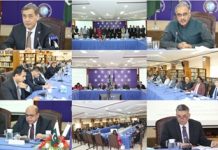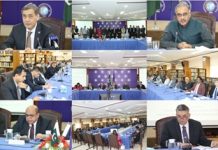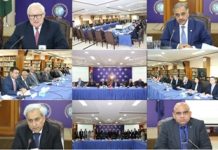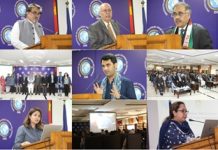The big vacuum of credibility, trust, genuineness, true representation, and clean image, helps the military run the country with the political horses it can choose at will, discard and replace when they are found too weak to pull the political cart
Since the October 1999 coup, every party in the opposition, regional, ethnic, Islamic or mainstream has been threatening to dislodge General Musharraf and his political associates through street agitation. Some have spewed more rhetoric, shown more enthusiasm and have been more active in fashioning up a coalition of groups, individuals and parties to achieve this end; others have been relatively more circumspect. On the ground, however, there are no visible signs of any agitation yet.
The examples of some of the states that have made the transition to democracy from military regimes show that pressure from below through mobilising the masses at the popular level, civil society and professional groups works in making the hard military regimes amenable to the idea of democratic change. The present regime has been in power now for more than seven years, and from the way it is preparing for the general elections next year, it is not likely to give up its hold on power anytime soon. The man on the top and his core of political allies, though not under great pressure, may simply change alignments among the groups eager to seek cooptation with them.
Why has the opposition failed in stirring any big political trouble so far, and why is it unlikely to produce any storm in the near future? Three factors, among others, stand out. Consider.
The first is the embarrassing political reality that a big section of Pakistan’s political elites have been more than willing to join the military governments. Ayub Khan achieved remarkable success in putting together a coalition of elites from the landed aristocracy, new industrial/business classes, and the civilian bureaucracy. This good lesson was never lost to successive military rulers, including the present one. Successive generations of the political elites, coming from socially dominant groups, have continued to join the military regimes without any scruple. The only exceptions are the Pashtun and Baloch nationalist groups.
The pattern of military-political elites, the latter in subordinate position, ruling together demonstrates two important points about Pakistani politics. First, we have a sort of elite consociationalism, with a nebulous consensus on controlled democracy. Second, for our political elites, power comes before principles or a commitment to democratic norms. There are also structural and social reasons for the willingness of the elites to seek collaboration with the military, but space does not permit a discussion of them here.
The second important factor for the failure of the opposition to mobilise society in the cause for democracy is its inability to engage the fledging civil society. The civil society, a product of economic development and modernisation, doesn’t trust the present class of political elites, whether they are with the government or in the two mainstream political parties, the Muslim League (Nawaz) and the Pakistan People’s Party. Their political incompetence, nepotism and corruption and their politics of polarisation and confrontation disappointed the civil society groups.
Most of the civil society seems to be committed to the basic principles of democratic governance. But it is not clear about what role it can and should play for helping the country transition to democracy. Civil society groups do a lot of advocacy for gender equality, rule of law, respect for human rights and freedoms, but they don’t want to organise or lead the movement for the restoration of democracy. Once there is a credible leadership with an agenda of change, some of the civil society groups may join as a supportive element rather than be in the vanguard. In democratic transition from mobilising masses to post-regime change reconstruction, civil society groups in the third-wave democratisation have played a vital role. The reason these groups may not play that role in Pakistan is that they are not entirely convinced about the democratic credentials of the opposition parties.
Third, and perhaps the most important factor disabling the political opposition is the structure of their parties and the social hierarchies of their leadership. The old political parties of Pakistan are closed political outfits, kind of family businesses in which the leaders at the top have acquired a divine right of sorts to run them, most often in an autocratic way, and frequently to safeguard interest of the dynasties. They are oblivious to the social and economic changes that have taken place during the past twenty years, notably the emergence of very large rural and urban middle classes.
Since the founding of the Pakistan People’s Party, for instance, and the mass mobilisation by Zulfikar Ali Bhutto, there has been remarkable growth of urbanisation and a manifold increase in the social and economic mobility of various sectors of Pakistani society. None of the old parties, including old-fashioned ethnic nationalists is open or democratic enough to give representation to the rising middle class of Pakistan. And the parties have no system or process to gauge the aspirations, changing values, opinions, likes and dislikes of different layers of society today.
Since democracy within the parties would have made the dynastic leaders vulnerable to leadership change, they never encouraged, allowed or even tolerated it. It was a design to control the party machines, not neglect. They have substituted efforts to build a support base through populism or by doing exactly what the military regimes have been doing: assembling an alternative coalition of political elites that have relatively secure political constituencies on account of their dominant social position. The label of a few parties, PPP being one such, makes a marginal difference in the final outcome of balloting. But the traditional base, first of the Muslim League and then of the PPP, has gradually withered away.
The two main opposition parties and the military regime know their weaknesses too well. This is why the leaders in Dubai and London are eager to explore back channels to strike a bargain, collaborate, and if the price is right, jump on the bandwagon and push the present crowd out. Unfortunately, our struggle for democracy will remain a struggle for power among the rival coalitions of elites, until new leaders with a new vision and a new programme emerge on our political horizon. But the emergence of such leaders may have to meet two preconditions: free and fair elections and, second, active involvement of genuine civil society groups (associations of lawyers, teachers, labour unions, students, teachers, farmers, and professional groups) in the struggle for democracy.
Neither of the two conditions is likely to materialise in the near future. The dominant elites, contrary to their public claims, have rigged elections when in power. They will not mind if the elections are rigged to make them win. Second, the civil society is middle class in ethos, values and aspirations and is not willing to throw its weight behind the traditional mainstream party leaders or the mullahs. The big vacuum of credibility, trust, genuineness, true representation, and clean image, helps the military run the country with the political horses it can choose at will, discard and replace when they are found too weak to pull the political cart.
The author is a professor of Political Science at the Lahore University of Management Sciences.













